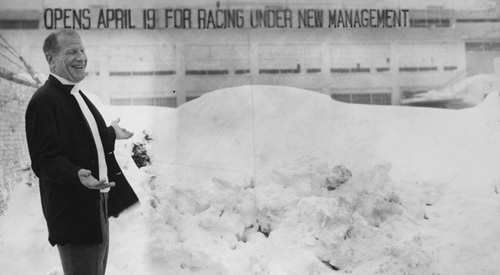
Veeck — As in Wreck (1962)
Rating: 8/10
It’s Tuesday night, late at the Rogers Centre, with Tampa Bay leading Toronto by just a run. Brett Lawrie’s at the plate, looks at two pitches and, assuming they’re both the fourth ball, he sets off to first only to be called back. The second time he’s called out on strikes.
He explodes, gets right into the umpire’s face and screams. As he’s led away he slams his battling helmet into the ground and it bounces into the umpire. His day is done. Later, as the umpire leaves, he’s splattered with beer by a fan with exceptionally good aim.
And the only thing I keep thinking is “What would Bill Veeck have done?” After all, Veeck once wrote “The umpires, having become sovereign entities, are arbitrary, officious and, worst of all, pompous. They should be reminded every payday that they have been placed out there on the field, like the bases, only to keep the game going.”
Bill Veeck was one of the most colorful figures and team owners in baseball history. He’s introduced the exploding scoreboard and fan giveaways (he once gave away 1,000 cans of beer to a single, very lucky fan). He signed the 3’7” Eddie Gaedel to bat for the St. Louis Browns and integrated the American League. He grabbed the game and dragged it forward into the 20th century. Hell, some of his ideas are still progressive, some 25 years after his death. In his candid memoir, Veeck as in Wreck, he lays out his time as an owner, complete with what he’d have done if he had his way.
A lifelong baseball man, Veeck at different times owned the Cleveland Indians, St. Louis Browns, Chicago White Sox (twice!) and the old, minor-league Milwaukee Brewers. He’s best remembered now for his promotional stunts and gimmickry, but by modern standards, his stuff is not only trendsetting, it’s pretty par for the course.
[php snippet=1]
A good example of this is his infamous exploding scoreboard: it’s more or less a regular scoreboard that shoots fireworks. Simple stuff, right? But consider all the work behind the explosions: 10 mortars, a fireworks crew, flashing lights and a 5,000-watt speaker system. Nobody in baseball was doing anything like this in 1960. Jimmy Piersall once threw a ball at the scoreboard; after a hitting a home run at Comiskey, Yankee players ran around their dugout, waving sparklers. And today, nearly every major league stadium does something similar.
His influence goes beyond the gimmickry. He came into baseball while the sport was still racially segregated. He broke the American League’s color barrier when he signed Larry Doby in 1947. This wasn’t easy on Doby, who was refused a room during spring training in Arizona, or on Veeck, who fought with everyone from stadium owners to his own players (“predictably, they were players of little talent,” noted Veeck).
But what makes the memoir a great read is how blunt and candid Veeck is. He’s not afraid to settle old scores with writers or fellow owners, nor is he afraid to own up to his own mistakes. He’s direct when dealing with a problem and he’s open when talking about the nuts and bolts of team ownership. This is a book that quickly goes from talking about home runs and fireworks to the workings of taxation. Throughout, Veeck keeps a casual attitude: it’s like listening to a conversation, not a lecture.
And the tales of his tricks are worth the price of admission alone. One gem comes from his time in Milwaukee. While reading the rule book, he realized that if the lights failed during a game, it would be stopped and replayed the next day. Replayed, not resumed, meaning it’d start over from the first inning. During a late season game against Indianapolis, down by a run and with a storm brewing (a rainout would make the game official), Veeck set his plan into motion:
We were one out from losing the game and dropping into second place when I happened to take out my handkerchief and, with a wide sweep of the arm, brought it up to wipe my forehead. At that moment, would you believe it, the lights went out. Ohh, everybody was hopping up and down.
The umpires demanded that I take them out to the electricians’ box to make an on-the-spot investigation. The electrician, a good sort, saw them coming and jammed a screwdriver into the works. By the time we had groped our way to the power box, he was cowering outside the door, as in mortal fear, while behind him, sparks were jumping all around the room.
The call from Judge Landis came at about nine the next morning.
Like the man himself, Veeck’s autobiography is fun, memorable reading for baseball fans. He bent the rules and changed how the game was presented and his influence is still felt even now. The Los Angeles Kings Twitter feed sounds like the sort of thing he’d enjoy. Veeck as in Wreck is a great way to learn a little more about the more interesting and important figures in baseball history.
[php snippet=1]

